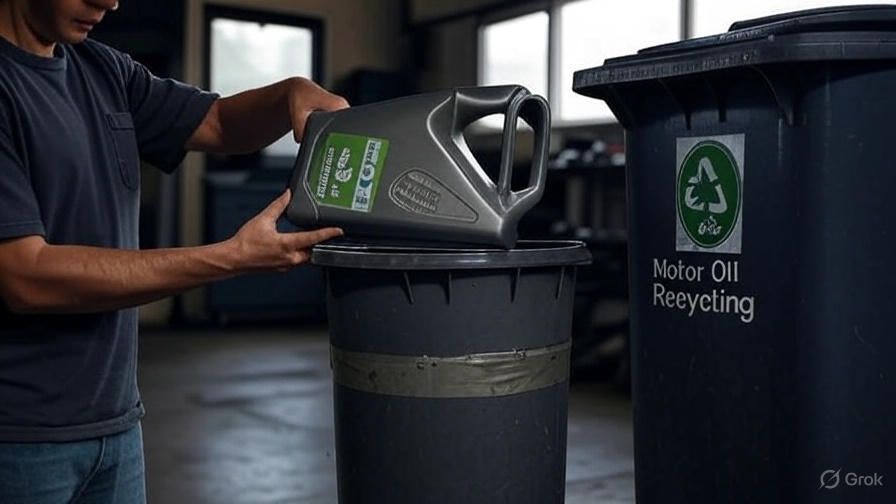Motor oil keeps your engine running smoothly, but once it’s used, this essential fluid becomes a hazardous waste that requires careful handling. Every year, millions of gallons of used motor oil get disposed of improperly, causing serious environmental damage. The good news? You can easily dispose of old engine oil safely while protecting the environment and following local regulations.
This comprehensive guide walks you through everything you need to know about motor oil disposal, from preparation steps to finding the right recycling centers. You’ll discover multiple disposal options, learn about environmental impacts, and get practical tips for handling oil spills and container management.
Why Proper Motor Oil Disposal Matters
Used motor oil contains harmful contaminants that accumulate during engine operation. Heavy metals, toxic chemicals, and combustion byproducts make old oil dangerous to soil, water systems, and wildlife. A single quart of used oil can contaminate up to 250,000 gallons of water – enough drinking water for 50 people for an entire year.
The Environmental Protection Agency classifies used motor oil as hazardous waste due to these toxic properties. Pouring oil down drains, onto the ground, or into regular trash creates lasting environmental damage. Storm drains lead directly to rivers and lakes, while oil in landfills can leach into groundwater supplies.
Recycling used oil, however, creates significant environmental benefits. Recycled motor oil can be refined into new lubricants, burned as fuel for energy recovery, or processed into other petroleum products. This process requires much less energy than refining crude oil into new lubricants.
Preparing Used Motor Oil for Disposal
Before disposing of your used engine oil, proper preparation ensures safe handling and acceptance at recycling facilities. Start by letting the oil cool completely after draining it from your engine. Hot oil can cause burns and increases vapor emissions that pose health risks.
Drain the oil into a clean container with a tight-fitting lid. Original oil containers work perfectly for this purpose, as do dedicated oil drain pans with pour spouts. Avoid mixing different types of automotive fluids – keep motor oil separate from transmission fluid, brake fluid, coolant, and other vehicle fluids.
Clean up any spills immediately using absorbent materials like kitty litter, sand, or commercial oil absorbents. Never hose down oil spills, as this spreads contamination and sends oil into storm water systems. Sweep up absorbed material and dispose of it as hazardous waste.
Store filled containers in a cool, dry location away from heat sources and out of reach of children and pets. Label containers clearly as “Used Motor Oil” with the date of collection. This labeling helps recycling center staff identify the contents and ensures proper handling.
Auto Parts Stores and Quick Lube Shops
Most auto parts retailers accept used motor oil for recycling, making them convenient disposal points for DIY mechanics. Major chains like AutoZone, O’Reilly Auto Parts, NAPA, and Advance Auto Parts typically have collection programs at most locations.
Quick lube facilities and oil change shops also accept used oil from customers. Jiffy Lube, Valvoline Instant Oil Change, and independent shops often welcome DIY oil changers who bring their used oil for proper disposal. Call ahead to confirm acceptance policies, as some locations have specific requirements.
These businesses benefit from oil recycling programs through rebates and environmental compliance. They often accept oil filters and empty oil containers as well, making them one-stop disposal points for oil change waste.
When visiting these locations, bring your used oil in sealed containers during regular business hours. Most shops prefer original oil containers or dedicated drain pans rather than makeshift containers. Staff can direct you to collection tanks or designated drop-off areas.
Municipal Recycling Centers and Household Hazardous Waste Programs
Local governments operate household hazardous waste collection programs that accept used motor oil along with other toxic materials. These programs typically run permanent collection sites or periodic collection events in communities across the country.
Municipal recycling centers often have dedicated areas for automotive waste, including used oil, filters, and antifreeze. Staff at these facilities receive training in hazardous waste handling and can provide guidance on proper disposal procedures.
Many cities and counties schedule special collection days for household hazardous waste, making oil disposal convenient for residents. These events often take place in parking lots of schools, community centers, or government buildings. Check your local government website or call city hall for schedules and locations.
Some areas offer curbside collection programs for certain hazardous wastes, though used motor oil typically requires drop-off disposal. Contact your waste management provider to learn about available programs in your area.
Service Stations and Gas Stations
Gas stations that perform automotive services often accept used motor oil from customers. Full-service stations with repair bays typically have waste oil collection systems already in place for their service operations.
Independent service stations and repair shops may accept small quantities of used oil from walk-in customers. These businesses understand the importance of proper oil disposal and often welcome community members who want to dispose of oil responsibly.
When approaching gas stations about oil disposal, speak with the manager or service department staff. Some locations have specific hours or procedures for accepting waste oil from customers. Bringing oil in appropriate containers helps ensure acceptance.
Chain gas stations with convenience stores may not have oil collection capabilities, so focus on stations that offer automotive services. Look for locations with service bays, oil change services, or automotive repair signs.
Walmart and Other Major Retailers
Walmart Auto Care Centers accept used motor oil at locations that provide automotive services. The company operates one of the largest networks of oil collection points in the United States, making disposal convenient for customers nationwide.
Other major retailers with automotive centers, including Costco, Sam’s Club, and some Target locations, may accept used oil. These retailers often have partnerships with oil recycling companies that handle collection and processing.
Before visiting these locations, call ahead or check their websites for specific policies. Some stores accept oil only from customers who purchased oil or services at their location, while others welcome all community members.
Retail automotive centers often have extended hours compared to traditional auto parts stores, providing flexibility for busy schedules. Many locations also accept oil filters and empty containers, simplifying the disposal process.
Earth 911 and Online Disposal Locators
Earth 911 operates a comprehensive online database that helps locate used oil disposal sites by ZIP code. Their website allows you to search specifically for motor oil recycling centers, providing addresses, phone numbers, and accepted materials for each location.
The American Petroleum Institute sponsors a similar locator tool that focuses specifically on used oil collection points. This resource includes auto parts stores, quick lube shops, service stations, and municipal collection sites.
Many state environmental agencies maintain their own online locators for hazardous waste disposal sites. These state-specific tools often provide the most current information about local programs and requirements.
Using these online tools saves time and ensures you find legitimate disposal options. Print out location information before heading out, as some collection sites have specific hours or seasonal schedules.
Oil Filter and Container Disposal
Used oil filters contain residual oil and metal components that require special handling. Most oil collection points also accept used filters, but some have specific requirements for filter preparation.
Drain oil filters for at least 12 hours before disposal, allowing gravity to remove most of the remaining oil. Puncture the filter dome with a screwdriver to help drainage, but avoid crushing filters unless specifically required by the collection site.
Empty oil containers can often be recycled along with the used oil. Clean containers thoroughly with soap and water, removing all oil residue and labels when possible. Some recycling programs require containers to be completely empty and clean before acceptance.
Plastic oil containers typically carry recycling codes that indicate their material type. Most are made from recyclable plastics that can enter standard recycling streams once properly cleaned. Check with your local recycling program for specific container requirements.

What Not to Do with Used Motor Oil
Never pour used motor oil down drains, toilets, or storm water systems. This oil will contaminate water treatment facilities or flow directly into natural water bodies, causing extensive environmental damage.
Avoid dumping oil on the ground, even in remote areas. Soil contamination from oil spills can persist for decades, killing vegetation and contaminating groundwater supplies. Oil also creates fire hazards and attracts rodents and insects.
Don’t mix motor oil with other automotive fluids or household chemicals. This contamination makes recycling difficult or impossible and may create hazardous reactions. Keep different fluid types separate during storage and disposal.
Resist the temptation to burn used motor oil in heating equipment not designed for this purpose. Home furnaces, fireplaces, and burn barrels cannot safely burn waste oil and may release toxic emissions into the air.
Environmental Benefits of Oil Recycling
Recycling used motor oil provides substantial environmental benefits compared to disposal or improper dumping. Recycled oil requires 85% less energy to produce than refining new oil from crude petroleum.
One gallon of used motor oil can be recycled into approximately 2.5 quarts of new lubricating oil. This recycled oil performs just as well as virgin oil while reducing demand for crude oil extraction and refining.
The recycling process also recovers valuable base oils and additives that would otherwise be lost. These recovered materials can be reprocessed into new motor oils, hydraulic fluids, and other petroleum products.
Oil recycling reduces greenhouse gas emissions associated with petroleum refining and transportation. The shorter supply chain for recycled oil products creates a smaller carbon footprint compared to virgin oil production.
Legal Requirements and Regulations
Federal and state regulations govern used motor oil disposal to protect public health and environmental quality. The Resource Conservation and Recovery Act (RCRA) establishes nationwide standards for hazardous waste management, including used oil.
Most states have adopted regulations that require proper used oil disposal and prohibit dumping or improper disposal methods. Violations can result in fines, cleanup costs, and legal liability for environmental damage.
Some jurisdictions require auto parts stores and service stations to accept used oil from customers, creating convenient disposal networks. These “take-back” programs ensure that oil purchased for DIY use has a proper disposal pathway.
Commercial generators of large quantities of used oil face additional requirements for storage, labeling, and disposal documentation. However, individual homeowners typically face fewer regulatory requirements while still being subject to dumping prohibitions.
Handling Oil Spills and Accidents
Small oil spills during transport or storage require immediate attention to prevent environmental contamination. Act quickly to contain spills using absorbent materials like clay-based kitty litter, sand, or commercial spill cleanup products.
Never use water to clean up oil spills, as this spreads the contamination and may wash oil into storm drains. Instead, allow absorbent materials to soak up the oil completely before sweeping up the contaminated material.
Dispose of oil-contaminated absorbents as hazardous waste along with the used oil. Many collection sites accept these materials together, simplifying cleanup and disposal.
For larger spills or spills that reach storm drains or waterways, contact local emergency services or environmental authorities immediately. These incidents may require professional cleanup and regulatory notification.
Cost Considerations and Incentives
Most used oil collection sites accept oil at no charge to encourage proper disposal. Auto parts stores, quick lube shops, and municipal programs typically provide free collection services as part of their environmental compliance efforts.
Some locations may charge fees for large quantities of oil or for accepting other automotive wastes like antifreeze or batteries. Call ahead to understand any potential costs before visiting collection sites.
Certain areas offer incentives for proper oil disposal, such as discounts on new oil purchases or rebates for bringing used oil to participating retailers. These programs help offset the costs of DIY oil changes while promoting responsible disposal.
The environmental and legal costs of improper disposal far exceed any inconvenience or expense associated with proper recycling. Soil remediation, water treatment, and regulatory fines can cost thousands of dollars compared to free disposal at recycling centers.
Storing Used Oil Safely
Proper storage prevents spills, reduces fire hazards, and maintains oil quality for recycling. Use containers specifically designed for oil storage, with tight-fitting lids and spill-resistant designs.
Store oil containers on level, impermeable surfaces away from heat sources, ignition sources, and areas prone to freezing. Concrete floors work well, while dirt or gravel surfaces increase spill risks.
Keep storage areas well-ventilated to prevent vapor accumulation, but protect containers from direct sunlight and precipitation. Indoor storage in garages or sheds provides ideal conditions for most climates.
Inspect stored oil containers regularly for leaks, corrosion, or damage. Replace damaged containers immediately and clean up any spills promptly using proper cleanup procedures.
Alternative Uses for Used Motor Oil
While recycling remains the preferred disposal method, some alternative uses exist for used motor oil under specific circumstances. These applications require careful consideration of environmental and safety factors.
Some people use filtered used oil for rust prevention on farm equipment, metal tools, or industrial machinery. This application works best with relatively clean oil that hasn’t been heavily contaminated during use.
Certain types of waste oil burners can safely burn used motor oil for heating purposes. These specialized units require proper installation, maintenance, and emission controls to operate safely and legally.
Used oil can serve as a dust suppressant on unpaved roads in some applications, though environmental regulations often restrict this use. Check local regulations before considering this option.
Finding Local Disposal Options
Start your search for oil disposal options by checking with nearby auto parts stores and quick lube shops. These businesses often provide the most convenient disposal points for small quantities of used oil.
Contact your local government’s environmental or public works department for information about municipal collection programs. Many communities offer regular collection events or permanent drop-off sites for hazardous waste.
Search online using tools like Earth 911’s recycling locator or your state environmental agency’s waste disposal database. These resources provide comprehensive listings of collection sites with current contact information.
Ask friends, neighbors, and local mechanics about their disposal methods. Word-of-mouth recommendations often reveal convenient local options that may not appear in online searches.
Conclusion
Proper motor oil disposal protects the environment while complying with legal requirements and supporting recycling programs. You have numerous convenient options for disposing of used oil, from auto parts stores to municipal collection programs.
The key steps include cooling and containing the oil properly, finding an appropriate collection site, and transporting the oil safely for disposal. Most collection points accept oil at no charge, making proper disposal both easy and cost-effective.
Remember that used motor oil can be recycled into new products, reducing the demand for crude oil and supporting environmental sustainability. Your responsible disposal contributes to this beneficial recycling process while preventing contamination of soil and water resources.
Take action today to dispose of any stored used oil properly. Contact local collection sites, gather your used oil in appropriate containers, and make the trip to ensure this valuable resource gets recycled rather than wasted. Your efforts make a real difference in protecting the environment for future generations.




